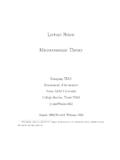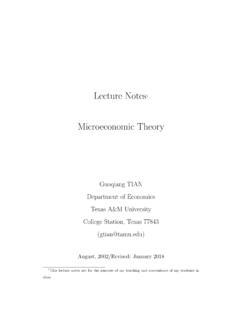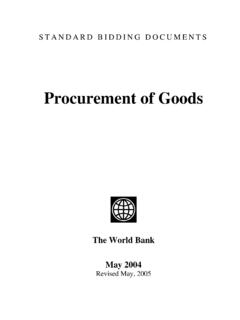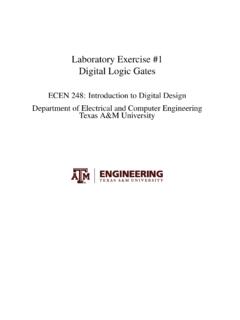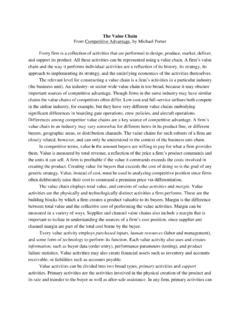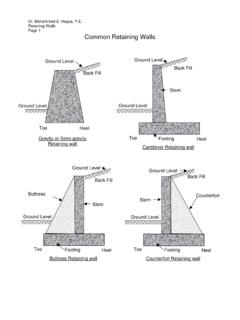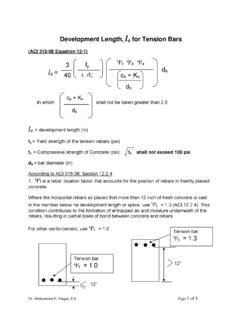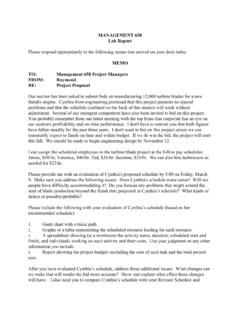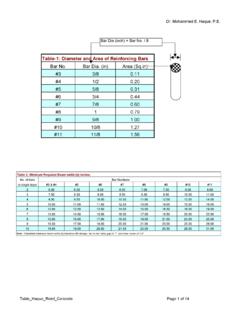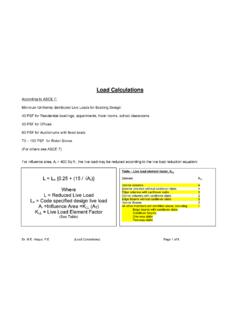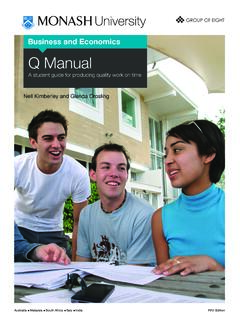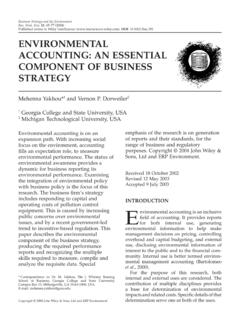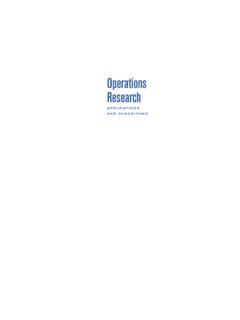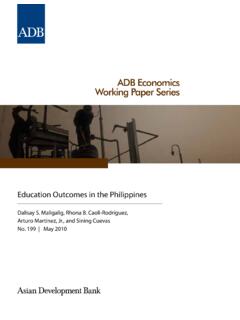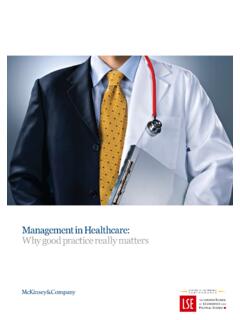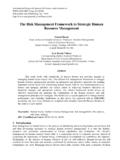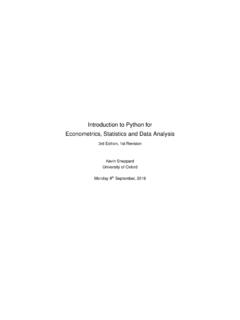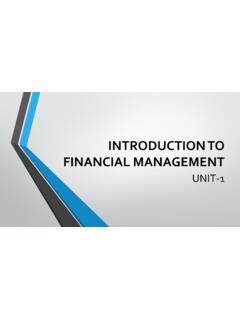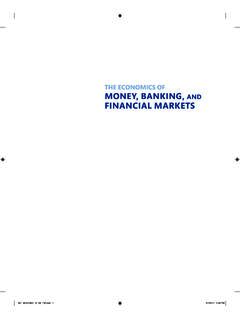Transcription of Advanced Microeconomic Theory1
1 Advanced Microeconomic Theory1 Guoqiang TIAND epartment of EconomicsTexas A&M UniversityCollege Station, Texas 2002/Revised: August 20181 This lecture notes are for the purpose of my teaching and convenience of my studentsin class. Please not distribute book of " Advanced Microeconomic Theory" is based on my lecturenotes that I have used for more than twenty years. I have added almostdouble the content of this notes into the book. The Chinese version of thebook was already published in 2016. This book is full-fledged and rich incontent, and has a wide range of topics, including almost all the typicalthemes in modern Microeconomic theory up to the frontier. It is also anintegration of my study, research, and teaching of Microeconomic theoryover the past 30 years.
2 This book is suitable for the courses of advancedmicroeconomics for graduate students, and the use of courses about top-ics of Advanced microeconomics. It can also be an important reference forresearchers. The English handout was used to teach courses at many uni-versities in and around China, including A&M University, Shanghai Uni-versity of Finance and Economics, Hong Kong University of Science andTechnology, Tsinghua University, and Renmin University of is a seemingly simple, but actually very difficult science tolearn, master, thoroughly understand, and truly comprehend. The reasonwhy the economic problems are difficult to solve is that, apart from themost basic objective reality that the individual (whether at the national lev-el or at the corporate, family or individual level) pursues profitability undernormal circumstances, the other major objective reality is that, in the vastmajority of cases, information among economic people is often asymmet-rical, it is easy to pretend: A person said something, but we didn t knowwhether he tell the truth or lie; even if someone stares at each other, seem-ing to be listening attentively, but we don t know if they really will increase the difficulty of understanding and solving problems.
3 Ifthey do not, it will offset the institutional arrangements effect. In this way,how to deal with these two most objective realities, what kind of econom-ic system, incentive mechanism and policy should be used have becomethe core issues and themes in all areas of economics. At the same time,economics often involves subjective value judgments. Different individu-als have different values and different opinions. For example, some peo-ple emphasize the efficiency of resource allocation. Some emphasize theequality of resource allocation. Individuals often have different views oneconomic reforms and policies. It is easy to cause great controversy, making34it difficult to understand and master economics and its logical addition, economics is a social discipline with a particularly strongexternality.
4 It has a large positive and negative externality (in the popularlanguage, so-called positive energy or negative energy). Unlike doctors, ifthey do not have good medical skills, they only damage or kill some indi-viduals. The bad application of economics affects all aspects of economicsociety, affecting society, groups and individuals. Therefore, the correc-t understanding, study, and master of modern economics, especially themain content of the microeconomics discussed in this book, is not only im-portant for the theoretical innovation of modern economics, but also moreimportant for practical applications. Once mistakes are made and wrongeconomic policies and systems are formulated, it will affect and endangernot only individuals, but also economic development at the national levelas a whole.
5 In this way, in addition to learning economics well, when itcomes to proposing policy recommendations, it is particularly not possibleto determine your thoughts by your position, so that too much to consideryour own interests. Therefore, in addition to being brave to play, you mustalso have social conscience and economics is an extremely inclusive and open discipline in dy-namic development. It has far surpassed the stage of neo-classical eco-nomics, and Economic practice in the world can provide rich realities forthe innovative development of economic theory. From the author s pointof view, as long as rigorous internal logic analysis (not necessarily a mathe-matical model) is used and rational assumptions (including bounded ratio-nality assumptions) are adopted, such research can belongs to the categoryof modern economics.
6 Under the framework of the discipline of moderneconomics, microeconomics is mainly about the theory of how individualsmake decisions. It is about the theory of how prices are determined. There-fore, it can be summed up in two heights. It is a theory about how marketsoperate, and it is also a theory about how the market should be remediedin some cases. It focuses on the study of how limited resources are allocat-ed between different uses to better meet the different needs of also constitutes the microfoundation of macroeconomics and almost allother areas of economics. It can help people understand how to fully andproperly play the decisive role of the market in resource allocation, andbetter play the role of the government in maintaining social fairness andjustice and providing public services.
7 It can play the dual role of "pointingthe way" and "improving techniques".Knowing the truth, we must know why. It is necessary to know thescope of adaptation of an economic theory, otherwise it will cause great so-cial negative effects once it is used to guide the formulation of economicpolicies. If we have limited training on the theoretical logic of modern eco-nomics and its empirical quantitative analysis, blindly shifting to the studyand application of realistic problems without paying attention to its theo-5retical preconditions, many problems will result. If we negate the role ofmodern economics, we will think that the basic theoretical assumptions ofthe existing mainstream economics are too strong, too focused on mathe-matics and rigorousness, and are too far apart from reality.
8 Therefore, it isbelieved that the real world problems cannot be explained and solved fact, in most cases, people who have such views do not understandthe prerequisites themselves, and thus do not know that theories have theirscope of application, and they blindly use them universally. Once wrong,they blame the theory is not good, and even think that the theory is fact, just like the theory of any discipline, every rigorous economic theo-ry gives preconditions. It is not valid in all situations. Therefore, unless thetheory itself has logical contradictions, there is no right or wrong betweenthem, but only which theory or model is most suitable for an economic in-stitutional environment. If there is no rigour, how can one always draw theresult of internal logic?
9 This is as pointed out by Professor Dani Rodrik2ofHarvard University. These accusations usually come from laymen or someunorthodox marginalists. Indeed, people who hold such arguments are of-ten those who have limited understanding of economic theory and meth-ods. Therefore, whether it is to do original research or practical applicationresearch, it is very necessary to learn economics well, grasp its analyticalframework and methods, and pay attention to the rigor of logical is the basic purpose of this a high-level course in microeconomics, the purpose of Advanced mi-croeconomics teaching is to reveal the rigorous internal logic behind somecommon principles and concepts, and to develop students ability and wayof thinking to analyze economic theory problems in a rigorous manner.
10 It salso the purpose to tell students how to grasp and characterize the natureof complex economic behavior and economic phenomena (ie, modelling)to conduct rigorous internal logical economic analysis. This book system-atically explains the contents of modern microeconomics from basic theory,benchmark theory, analysis framework, research methods to the latest fron-tier topics. Therefore, all or part of the chapters can be selected accordingto the course requirements as Advanced microeconomics course materialsfor economics, finance, statistics, management, applied mathematics, andrelated disciplines for doctoral, postgraduate and senior undergraduate s-tudents. This book can also serve as an important reference for teachersand scholars engaged in economics teaching and characteristics of this bookWhile the mainstream of economic profession prior World War II focusedmainly on economic thoughts, in great extent, lacking scientific rigor, but2 DANI RODRIK.
